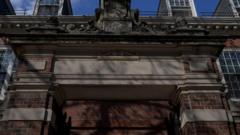In a decisive move, a US judge has temporarily blocked the Trump administration from implementing measures that would restrict Harvard University's ability to enroll international students, affirming the university's legal rights amidst ongoing tensions regarding free speech and governmental oversight in academia.
Temporary Injunction Blocks Trump's Plan to Restrict Harvard's Foreign Student Enrollment

Temporary Injunction Blocks Trump's Plan to Restrict Harvard's Foreign Student Enrollment
A judge issues a temporary restraining order preventing the Trump administration from revoking Harvard University's access to foreign student programs, amidst a legal battle over free speech and administrative control.
A US District Court judge has stepped in with a temporary restraining order, halting the Trump administration's recent move to strip Harvard University of its ability to enroll foreign students. This ruling came swiftly in response to a lawsuit filed by Harvard after the White House announced plans to limit international student admissions. The university characterized the administration's actions as a "blatant violation" of legal statutes and an infringement on free speech rights.
The Trump administration’s reasoning for these restrictions alleges that Harvard has failed to adequately rebut antisemitism and reshape its hiring and admissions standards, claims which the institution vehemently contests. Following the legal intervention, Judge Allison Burroughs highlighted the potential impact of such actions, noting that international students constitute roughly 27% of Harvard's student body and play an integral role in the university’s mission.
"The administration's decision could erase a significant portion of Harvard's identity," the university noted in its lawsuit. Harvard President Alan Garber emphasized in a letter the unjust nature of the government's actions, referring to it as "unlawful" and aimed at punishing the university for its commitment to academic independence.
In the wake of the temporary order, White House deputy press secretary Abigail Jackson criticized the judiciary, arguing that judges should not obstruct the administration's authority over immigration policy. The broader context suggests that the administration is engaging in a prolonged showdown with elite universities over claims of bias in their curricula and campus environments.
As graduation approaches, anxiety blankets the foreign student population at Harvard. For students like Cormac Savage from Northern Ireland and Rohan Battula from the UK, the turbulence has cast uncertainty over their futures. Savage, set to graduate shortly, has begun to seek opportunities abroad due to fears surrounding his visa status, while Battula expressed relief but acknowledged that the apprehension had been overwhelming.
With approximately 6,800 international students, Harvard's significant reliance on this demographic extends beyond educational enrichment—it is also a critical financial pillar. Experts believe that international students are more inclined to pay full tuition, which indirectly supports financial aid for domestic students, with total costs exceeding $100,000 annually.
In the larger picture, Trump’s administration not only targets Harvard but has actively challenged various elite educational institutions, alleging their failure to curtail radicalism. With financial consequences looming, including a freeze on federal funding amounting to $2.2 billion and threats to revoke tax-exempt status, the legal discourse surrounding university governance and student rights continues to evolve.
The legal battles involving Harvard may very well set precedents that impact numerous similar scenarios nationwide. Legal professionals warn that while Harvard possesses the resources to contest these actions, the interpretation of laws at the Supreme Court can lead to unpredictable outcomes. In the meantime, international students remain in a precarious position, caught between legal disagreements and the fundamental need for stability in their academic careers.




















